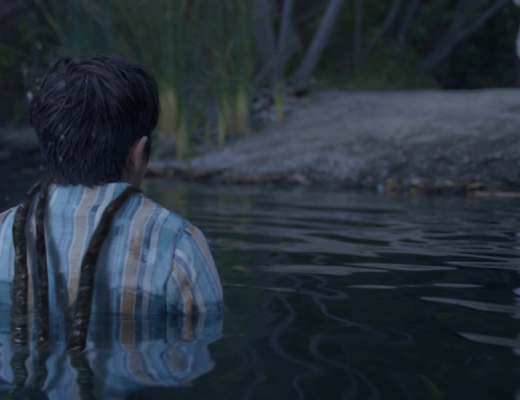The Holocaust has provided the backdrop for so many films that it’s a rather bracing experience to discover one that handles the subject and setting in a way that’s unique. That’s certainly the case with A Radiant Girl, the debut feature by actress Sandrine Kiberlain (Mademoiselle Chambon, Life of Riley), which follows Irene (Rebecca Marder), a young Jewish student living in occupied Paris during the summer of 1942. Irene dreams of becoming an actress, and her days are filled with rehearsals, read-throughs, and daydreaming with her fellow students — and one in particular, Jacques (Cyril Metzger), a potential love interest with whom she begins an innocent flirtation.
It is an idyllic existence, seemingly unaffected and unaware of the Nazi occupation that surrounds it. In fact, A Radiant Girl never acknowledges Nazis by name or even the invasion at all; but we begin to see its effects in often understated ways. Jews, we hear, will soon be forced to list their religion on their ID papers. Jewish families see radios removed from their homes to disconnect them with the outside world (“They better return these eventually,” Irene sniffs, indignantly). It isn’t until the very last frame of the film that the full extent of creeping fascism is finally felt, and it’s a remarkable gut punch. Kiberlain portrays the rising tide of antisemitism like a dripping faucet, and it isn’t until it’s too late that her protagonist understands the flood that has upset her world. It’s this careful, measured build-up that makes A Radiant Girl such a powerful film: for much of its runtime, it plays like the summer exploits of a young woman, a coming-of-age tale about an aspiring actress, full of budding romance and unfulfilled promise — a fact that makes its ultimate trajectory all the more tragic.
The film remains rather low-key for most of the runtime, keeping its focus tight and intimate as it explores Irene’s world. In fact, it’s such a notably laid- back affair that one almost forgets it’s a Holocaust film at all, so subtle are the textures here, be they the period trappings or the depictions of antisemitic action. You can feel Kiberlain’s characters convincing themselves that what’s happening is something that’s only happening “over there,” that other Jews are only being targeted because they’re Polish, but history testifies to the tragic fallacy of such thinking, and the experience of watching the film bears the viscerality of a slow-motion car crash.
A Radiant Girl lacks many of the signifiers that often accompany Holocaust films, and Kiberlain, displaying uncanny confidence in her first film as a director, does a lovely job of making the action feel contemporary (one is almost even reminded of Christian Petzold’s Transit), and the instances of anti-Jewish hatred seem somehow minuscule, rendered as the kinds of things that might have passed by unnoticed by the characters, but which will impactfully land with an audience. We know exactly where this is heading, but they do not, and it paints an often-haunting portrait of the devastating effects of simmering, unchecked hatred, the incrementalism of which reflects the old parable of the frog in boiling water — it doesn’t even notice the water is heating up until it’s already cooked. It may meander a little in its middle section, but that’s part-and-parcel to its mode and a reason why it works so well — A Radiant Girl offers a chilling look at fascism’s accumulating evil in a way that lulls its audience into a sense of complacency — a pointed mirroring — and then pierces right straight through the heart when it’s least expected.
Published as part of Cannes Film Festival 2021 — Dispatch 3.







